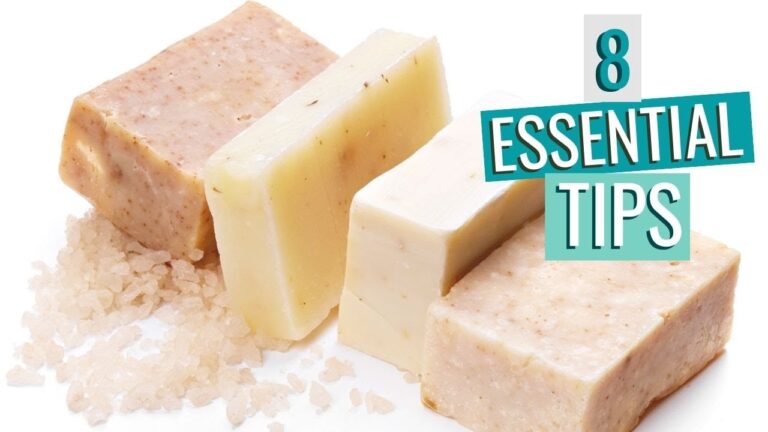In recent years, there has been a growing interest in incorporating sustainable practices into various industries, including soap crafting. From using organic ingredients to minimizing waste and supporting ethical sourcing, soap makers are finding creative ways to reduce their environmental impact. In this article, we will explore the innovative techniques and strategies being implemented in the world of sustainable soap crafting, and how these practices are not only benefiting the planet, but also creating beautiful, high-quality products.
What are the ways in which soap can be made sustainable?
By choosing sustainable soaps, consumers can actively reduce their environmental footprint. These soaps are typically made from organic and ethically sourced materials, ensuring that no harmful chemicals are released into the environment during production or use. Making the switch to sustainable soap not only benefits the planet, but also supports responsible and eco-friendly businesses.
In addition to being environmentally friendly, sustainable soaps are also gentle on the skin. Natural ingredients like coconut oil, shea butter, and essential oils provide nourishment and hydration without harsh chemicals or artificial fragrances. By opting for sustainable soap options, individuals can prioritize both their skin health and the health of the planet.
What are some eco-friendly ways to pack soap?
When it comes to packing soap eco-friendly, the key is to avoid plastic. Instead, opt for wrapping soaps in kraft paper or printed fabric. Not only is this a more sustainable choice, but it also adds a touch of charm to the packaging.
By using kraft paper or printed fabric to package your soap, you can reduce your environmental impact and appeal to eco-conscious consumers. This eco-friendly approach not only benefits the planet, but it also adds a unique and stylish touch to your product.
What is eco-friendly soap?
Eco-friendly soap is a type of soap that is made from natural, sustainable and non-toxic ingredients. These ingredients are biodegradable and do not harm the environment when they are washed down the drain. Eco-friendly soaps are often made without synthetic fragrances, dyes, or preservatives, and are packaged in recyclable or biodegradable materials.
These soaps are also often cruelty-free, meaning they are not tested on animals, and are made in a way that minimizes their carbon footprint. Many eco-friendly soaps also support fair trade practices, ensuring that the workers involved in the production of the soap are treated fairly and paid a living wage. Overall, eco-friendly soap is a more sustainable and ethical choice for both the environment and the people involved in its production.
By choosing eco-friendly soap, consumers can reduce their impact on the environment while still enjoying high-quality, effective cleansing products. These soaps are a great option for those who are looking to minimize their use of synthetic chemicals and support sustainable, ethical practices. With a wide range of options available, there is an eco-friendly soap for every preference and need, making it easy to make the switch to a more sustainable and responsible choice.
Eco-Friendly Soap Making: Sustainable Techniques for a Cleaner Environment
Are you looking for ways to reduce your environmental impact while still enjoying luxurious soap? Look no further than eco-friendly soap making! By using sustainable techniques, you can create beautiful soaps that are gentle on both your skin and the planet. From choosing natural ingredients to minimizing waste, there are plenty of ways to make a positive difference for a cleaner environment.
One key aspect of eco-friendly soap making is selecting ingredients that are both effective and environmentally friendly. Opt for organic oils and butters, as well as natural colorants and scents. By avoiding synthetic additives and harsh chemicals, you can create soaps that are safe for both your body and the Earth. Plus, using ethically sourced ingredients can help support small-scale farmers and sustainable practices.
In addition to choosing eco-friendly ingredients, consider how you can minimize waste throughout the soap making process. Reuse packaging materials, such as glass jars or paper boxes, and recycle any leftover materials. By being mindful of your waste production, you can create soaps that are not only beautiful and nourishing, but also sustainable for a cleaner environment. Join the eco-friendly soap making movement today and make a positive impact on both your skin and the planet!
Crafting a Greener Future: Eco-Conscious Soap Making Methods
In today’s world, sustainability is a top priority for many consumers. As a result, eco-conscious soap making methods have become increasingly popular. By utilizing natural and organic ingredients, soap makers can reduce their environmental impact while still producing high-quality products. This shift towards greener practices is not only beneficial for the planet, but also appeals to a growing market of environmentally conscious consumers.
One of the key components of eco-conscious soap making is the use of biodegradable and renewable materials. This includes ingredients such as plant-based oils, natural colorants, and essential oils. By choosing these sustainable alternatives, soap makers can minimize their carbon footprint and avoid harmful chemicals that can pollute the environment. Additionally, eco-conscious soap making methods often involve reducing waste through practices such as recycling packaging and minimizing water usage during production.
Crafting a greener future through eco-conscious soap making methods is not only about the ingredients used, but also the production process itself. Many soap makers are embracing energy-efficient manufacturing techniques, such as cold-process soap making, which requires less energy and produces less waste compared to traditional methods. By adopting these sustainable practices, soap makers can play a significant role in preserving the environment for future generations while meeting the growing demand for eco-friendly products.
Incorporating sustainable practices in soap crafting not only benefits the environment but also promotes a healthier lifestyle for consumers. By using natural ingredients, minimizing waste, and supporting ethical sourcing, soap makers can contribute to a more eco-friendly industry. Embracing sustainability in soap crafting is a small yet impactful way to make a positive difference in the world, one bar of soap at a time.



